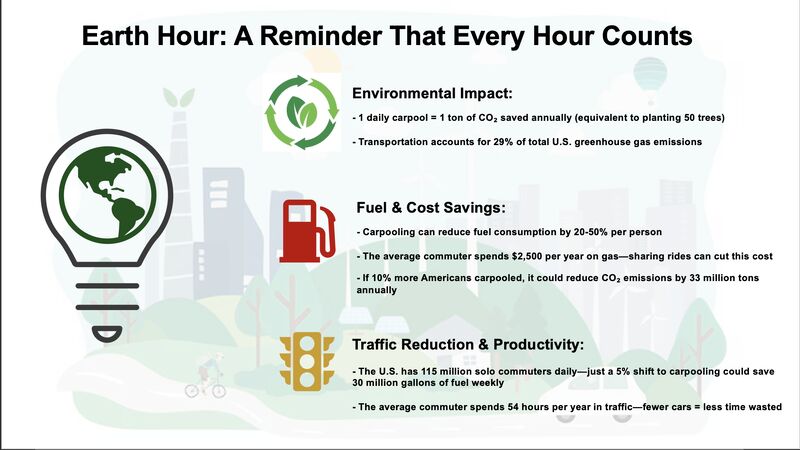Earth Hour: A Reminder That Every Hour Counts 🌍
Earth Hour lasts 60 minutes—but what if your impact lasted all year? This blog explores how daily choices like carpooling can turn symbolic action into real, measurable change for the planet.


Every year, Earth Hour serves as a symbolic moment when millions around the world switch off their lights to show support for our planet. But what if we extended this action beyond just an hour? What if we made small, consistent choices that have a lasting impact—like carpooling?
Carpooling: A Year-Round Light Switch for the Planet
While turning off the lights for an hour raises awareness, daily habits like carpooling have tangible environmental benefits. Consider this:
1 daily carpool can save up to 1 ton of CO₂ annually. That's equivalent to planting about 50 trees each year! 🌱
Traffic congestion accounts for nearly 30% of urban CO₂ emissions. Reducing the number of cars on the road eases congestion and cuts pollution.
Carpooling can reduce fuel consumption by 20-50% per person, depending on the number of passengers. Less fuel burned means fewer emissions.
The U.S. alone could reduce carbon emissions by 33 million tons annually if just 10% more people chose to carpool regularly.
Here are some useful data points for carpooling:
Environmental Impact
🚗 1 daily carpool = 1 ton of CO₂ saved annually (equivalent to planting 50 trees).
🌍 Transportation accounts for 29% of total U.S. greenhouse gas emissions (EPA, 2023).
🚦 Traffic congestion leads to 3 billion gallons of wasted fuel in the U.S. annually (Texas A&M Transportation Institute).
Fuel & Cost Savings
⛽ Carpooling can reduce fuel consumption by 20-50% per person, depending on the number of passengers.
💰 The average commuter spends $2,500 per year on gas—sharing rides can cut this cost significantly.
🏠 If 10% more Americans carpooled, it could reduce CO₂ emissions by 33 million tons annually (U.S. Department of Transportation).
Traffic Reduction & Productivity
🚘 The U.S. has 115 million solo commuters daily—just a 5% shift to carpooling could save 30 million gallons of fuel weekly.
⏳ The average commuter spends 54 hours per year in traffic—fewer cars = less time wasted!
Beyond Earth Hour: A Simple Challenge
Earth Hour is a great reminder to act, but meaningful change happens when we integrate sustainability into our daily lives. So, here’s a challenge:
Commit to one carpool this week. Whether it’s sharing a ride to work, school, or even a weekend event, every small action adds up.
Let’s make every hour count.
